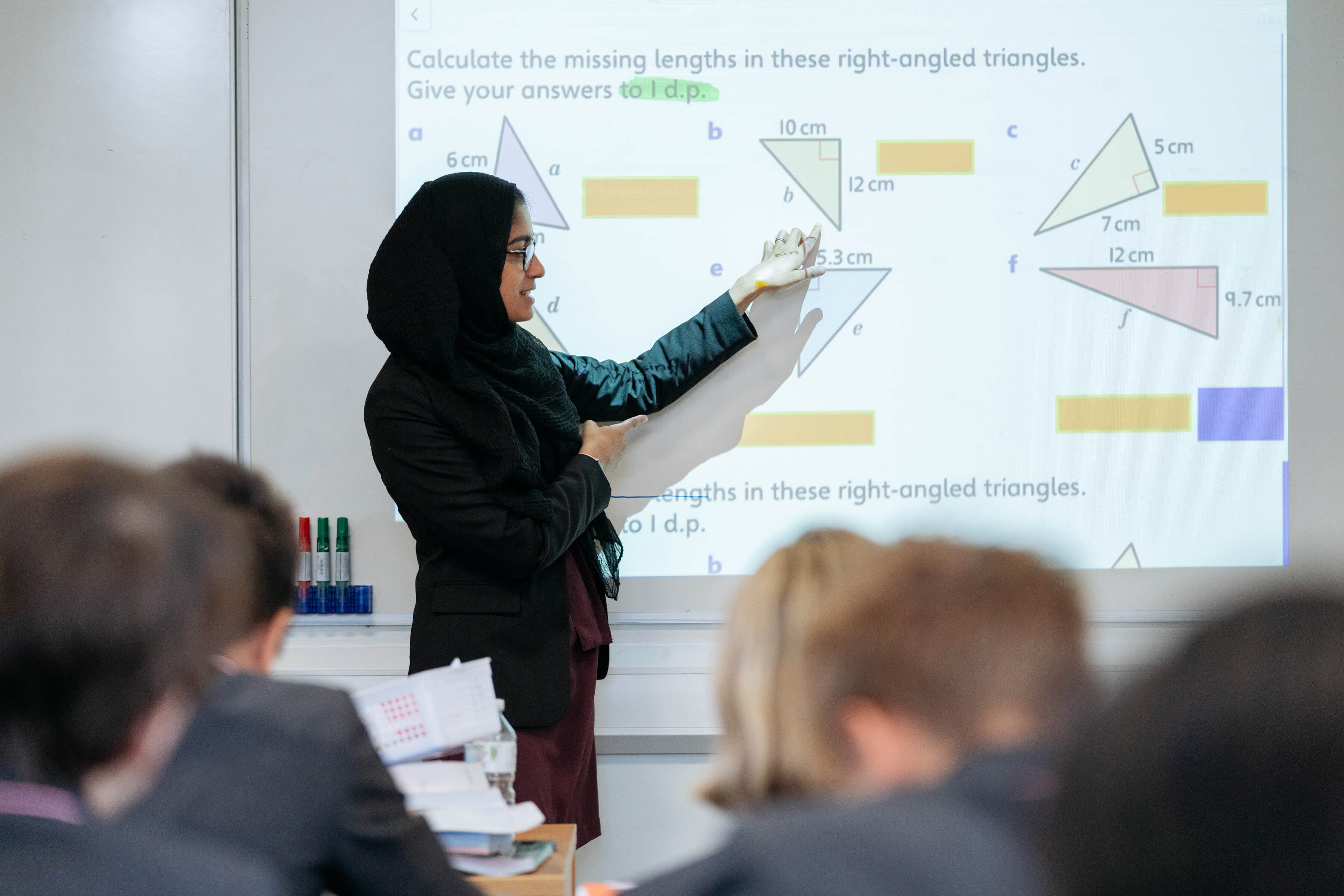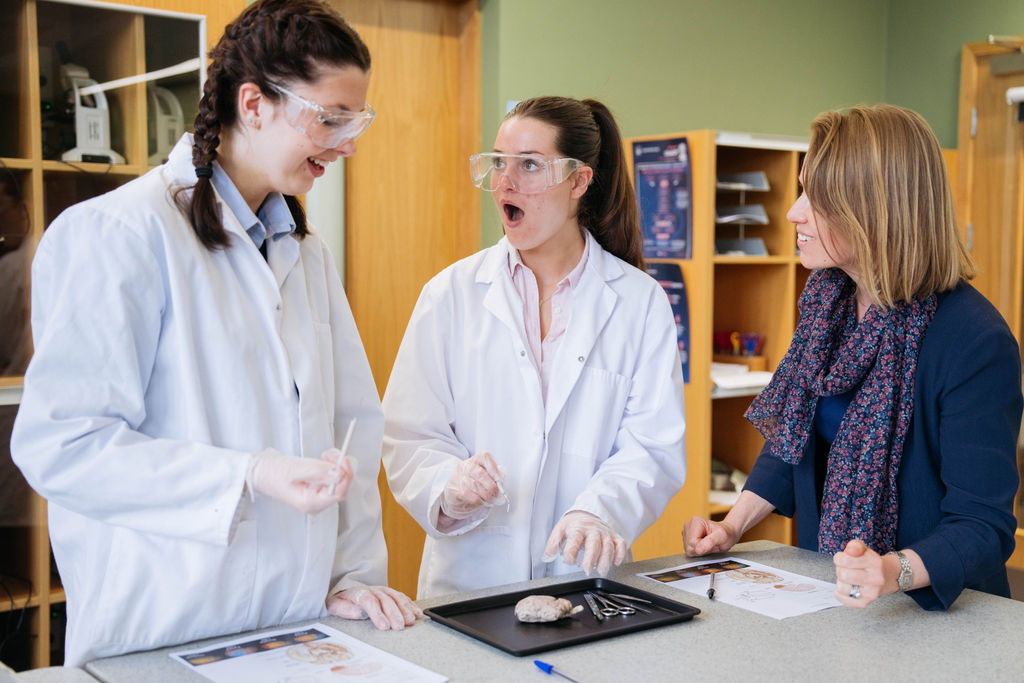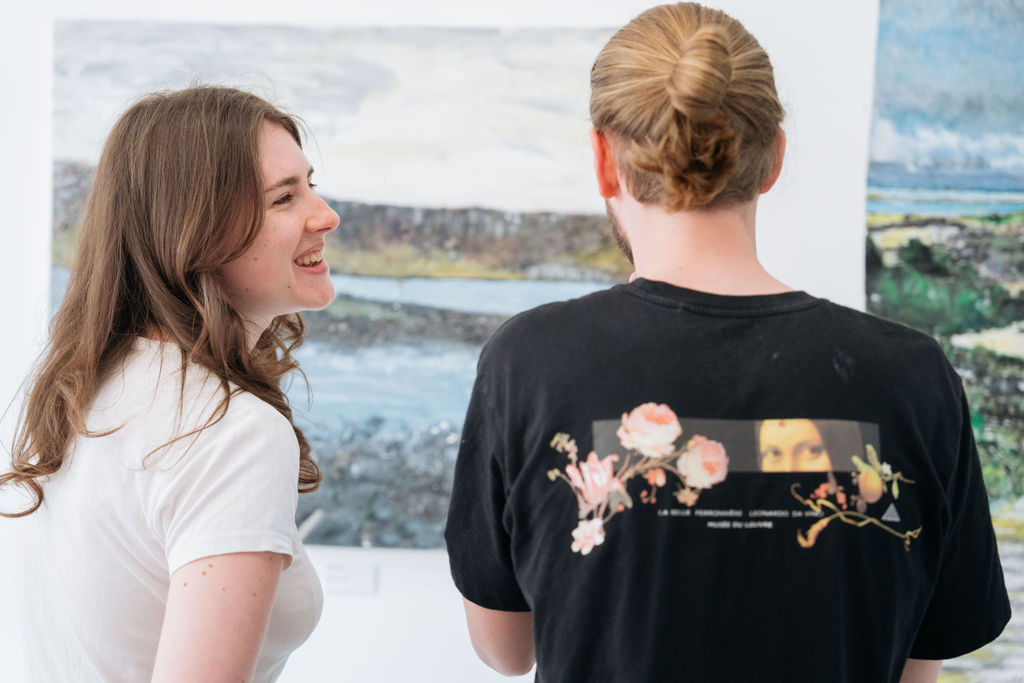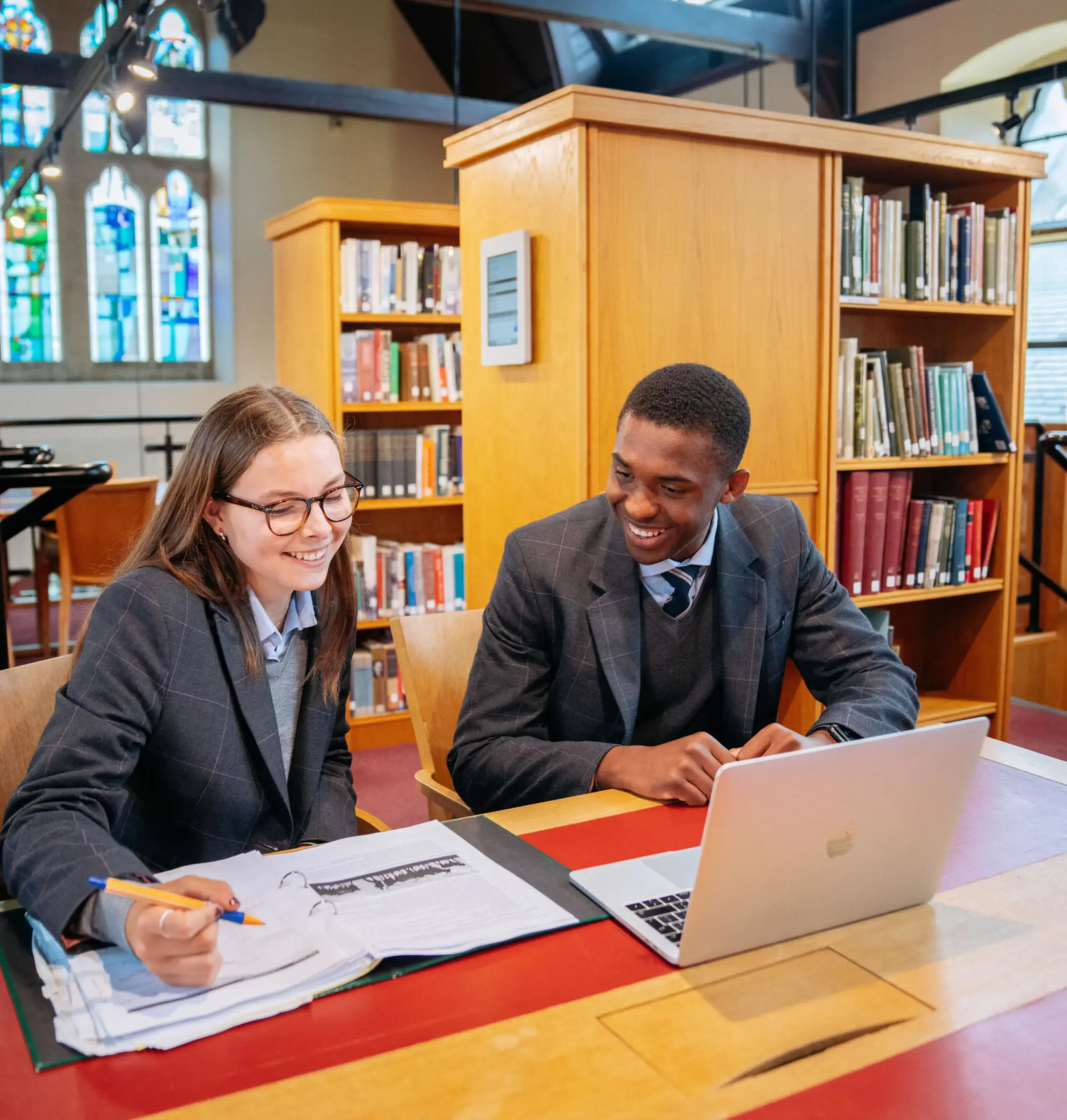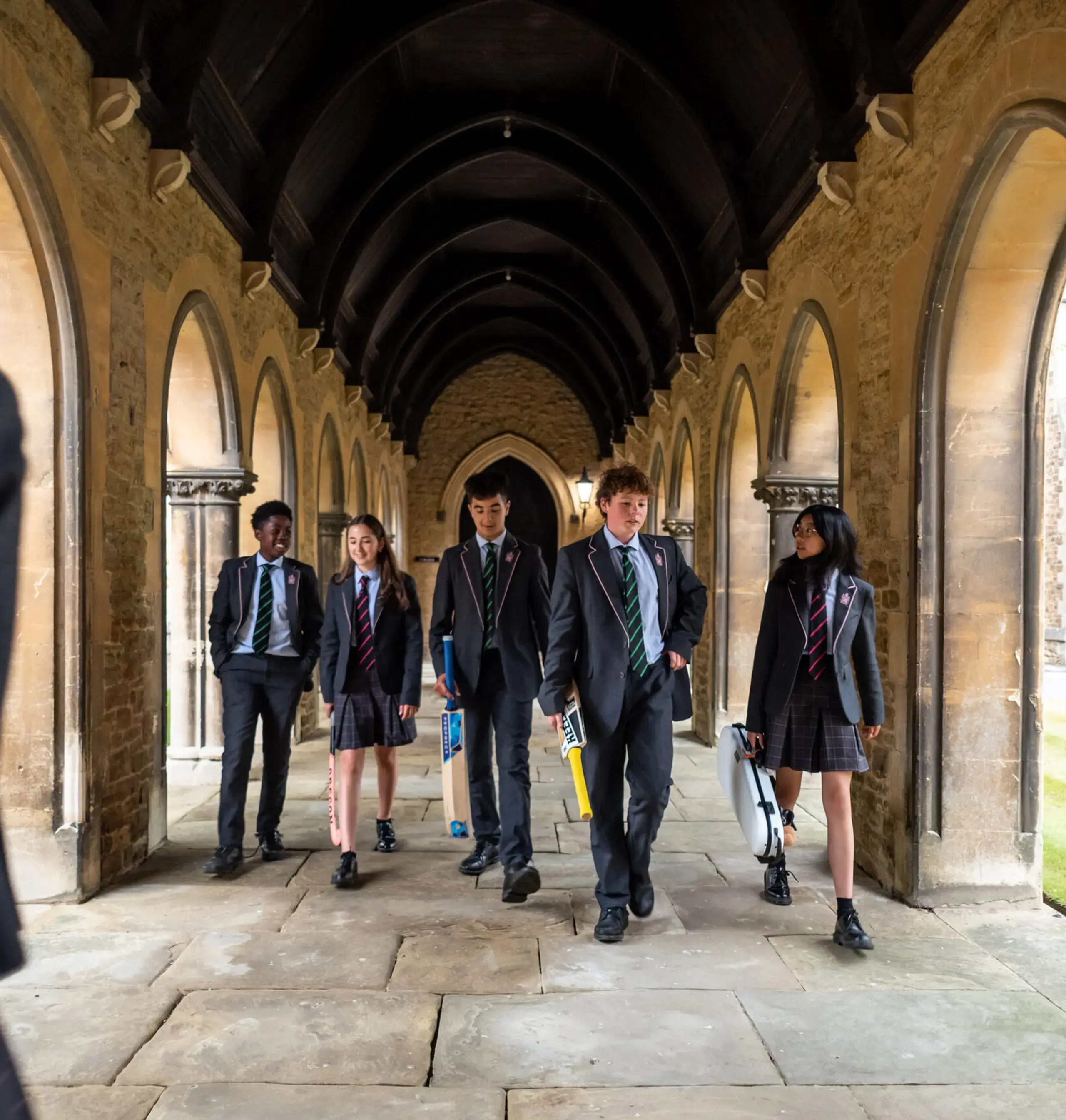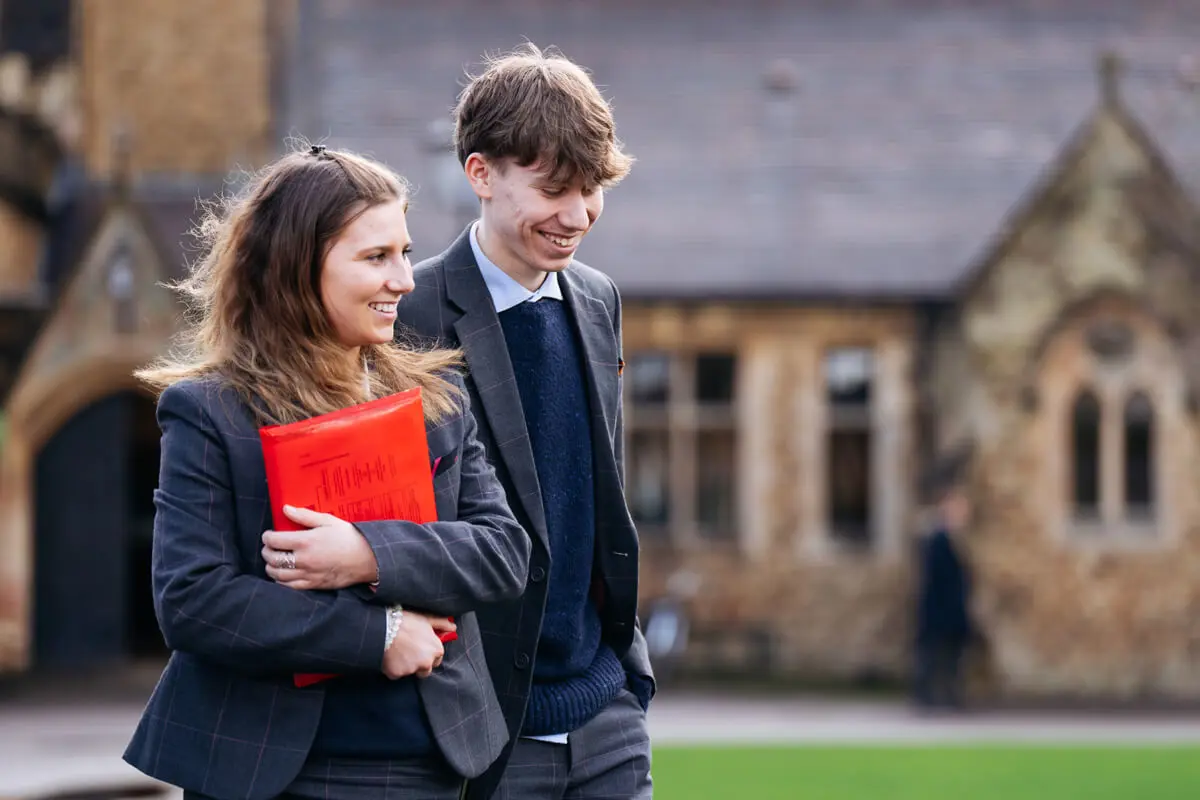Academic Departments
Twenty vibrant academic departments are at the very centre of Charterhouse's ambitious academic environment. Our inspiring teachers are all subject specialists. Many are graduates from amongst the world's top 100 universities, and a significant proportion hold post-graduate degrees.
The size and diversity of our teaching staff (we have 145 part-time and full-time teachers) ensures that we can offer an excellent breadth of subjects across our GCSE and twin-track Sixth Form curricula (IBDP and A Level).
| Art & Design |
|---|
|
Our vibrant Art & Design Department offers:
The Studio staff are all teaching enthusiasts as well as respected artists in their own right. The highly creative and inclusive teaching environment is central to the success of pupils at all levels. Charterhouse Art Director, Helen Pinkney is a distinguished artist and teacher who puts creativity and learning at the heart of her own practice and teaching. In Year 9 the pupils work within five-week intensive blocks and experience a foundation in Art, Design and Textiles as a preparation for GCSE. Pupils who choose to pursue art at GCSE level are encouraged to experiment widely and then specialise in an area where they learn to refine their practice and express individual ideas. An open and creative mind are key at GCSE level as pupils are taught techniques to express their ideas. At Sixth Form pupils are encouraged to aim high as they learn to take risks with wide ranging materials that they may not have experienced before. They research their ideas in depth and are encouraged by visits to inspiring exhibitions which challenge their own practice. Study trips are offered at both GCSE and Sixth Form. Recent destinations have included New York and St Ives. Trips with other departments are also favoured as pupils are encouraged to make connections across their subjects. The Art Department, known as Studio, is a purpose-designed building with facilities for painting, drawing, printmaking, sculpture, ceramics, fashion/textiles and digital work. Studio has a strong tradition of life drawing and visits to art galleries abroad (e.g. New York, Los Angeles and St Petersburg) and more locally (e.g. Tate Modern and numerous London galleries). There is a belief in active engagement with both contemporary art and art history. Sixth Form pupils are exposed to an intensive and highly creative programme of workshop sessions which allow them to experience a much wider and personal range of expression. They populate their own workspaces with ideas, experiments and resolutions. Their sketchbooks play a key part in recording their progression and become individual to the pupil’s ways of working. Portfolios showcasing a progression of ideas as well as making links to other artists. Art in the Sixth Form has always maintained a high profile with pupils achieving top grades and entering Art College to study fine art, architecture, fashion and textiles, design, art history, advertising, film and photography. With creativity being a key element across a range of further education courses, A Level art, design and textiles has proved successful in enabling pupils to study a wide range of university degrees. |
| Biology |
|
Biology at Charterhouse seeks to inspire and support pupils in all aspects of this diverse subject, whether for its relevance to every day life, for pure scientific curiosity or for the pursuit of careers such as medicine or research. Charterhouse has a strong tradition for Biology. Our brand new teaching laboratories are adorned with historic specimens, such as a duck billed platypus, a narwhale tusk and a mammoth’s tooth. The labs are equipped with the most modern microscopes and electrophoresis equipment, and they are supported with a team of three expert technicians. Our philosophy is to deliver a curriculum that is enriched with the many aspects of the subject that are relevant to life and to society. Teaching is delivered through a rigorously scientific and practical approach that seeks to inspire young biologists. All pupils study Biology to IGCSE and Biology is a very popular choice for Specialists, being studied by a quarter to one third of all sixth form pupils. Many go on to study Biology at internationally renowned courses in the UK or abroad or related courses such as Medicine or Biomedical Sciences. We have a Medics Society, Perception Society (neuroscience and psychology), Polunin (university Biology thinking) and a Dissection Society, all of which are very popular with pupils. |
| Business and EntreprenEurship |
|
We support future business leaders, equipping every pupil with the tools necessary to thrive in established businesses and startups. As a department, we are passionate about businesses; how they work, why they fail, and how they change the world we live in. The study of business is incredibly rewarding. We enjoy looking under the hood of businesses and industries, understanding the people behind business success, acknowledging the context necessary for business growth. We spend time applying a range of management theories to different business types across the world. We are never too far away from the Financial Times or The Economist, ensuring that we all have a foundational understanding of business today, and what business might look like when pupils start their first job. We are excited about the role business can play in our fight against climate change, and our pursuit of a socially responsible and inclusive business environment. Corporations have it within their grasp to achieve both profit and positive social and environmental outcomes. As a department, we promote those businesses that want to do more than simply make money. As a department, we think deeply about the importance of entrepreneurial thinking for pupils, teachers and businesses. Pupils of business at Charterhouse will leave with an entrepreneurial mindset, ready to challenge existing structures and industries, willing to ask ‘why?’, when something doesn’t make sense, and benefiting from an entrepreneurial approach to managing their time and careers. |
| Chemistry |
|
Chemistry is an extremely successful subject at Charterhouse and the department can boast the discoverer of two elements (Pd, Rh) amongst its Old Carthusians. The department is staffed by a well-qualified team of subject specialists several of whom have taught Chemistry at a university level. The labs are well stocked with modern laboratory equipment including UV-Vis spectrometers and a diamond IR-spectrometer. Each year many pupils go on to read Chemistry or a related subject, such as Natural Sciences or Medicine, at university. |
| Classics |
|
Classics – the study of the languages, literature, history and culture of ancient Greece and Rome – thrives at Charterhouse, where it has a rich and distinguished tradition of scholarship. The department boasts an experienced and diverse team of specialists in classical literature, social anthropology, art, architecture and history, some of whom have taught Classics at university level. Results are consistently excellent at all levels and Oxbridge numbers are good. The School has a proud tradition of Classical scholarship. Amongst our alumni are Sophoclean scholar Richard Jebb, lexicographer Henry Liddell, and novelist Robert Graves; former Housemasters include TE Page and GS Davies. We are fortunate to have a remarkable collection of antiquities in our archive, including a wide range of pottery in some cases over 3000 years old. Charterhouse remains one of the few schools to offer an entrance scholarship in Classics – the Benn Scholarship, named after two Carthusians who lost their lives in WWI. All Year 9 pupils study Latin, and uptake to GCSE is around 50 pupils. At GCSE and A Level pupils have the option to take Latin, Ancient Greek and Classical Civilisation. Classics is considered by employers an enviable grounding for law, financial services, marketing and computing. |
| Computer Science & Informatics |
|
All Year 9 pupils will explore the world of computing and coding, ensuring they have a good understanding of the systems underpinning the digital age. Pupils will be encouraged to think logically to solve problems as well as develop hands on experience in electronics and robotics. In Year 10 and Year 11, pupils taking GCSE Computer Science will apply their understanding to develop computer-based solutions to problems using algorithms. Pupils will be taught to code using Python, a popular high-level programming language, but the fundamental techniques will provide pupils the skillset to learn other languages. The skills learnt can also be used in other areas of study and in everyday life. Learners will develop a range of technical skills, as well as being able to effectively test and evaluate computing solutions. This course will help learners appreciate current and emerging computing technologies, the benefits of their use and recognise the ethical issues and potential risks when using computers. The course is assessed by two examinations that are marked externally; there is no coursework. |
| Design Engineering |
|
The Design Engineering curriculum is linked to context, the outside world and is interdisciplinary in nature. Former pupils have gone on to have exciting, rewarding and innovative careers with top Design Engineering firms, in a range of disciplines from product development and innovation, to protecting intellectual property. Others have become entrepreneurs and inventors, launching successful companies in cutting-edge fields of technology. We help pupils become creative problem solvers as an individual and as a member of a team, by equipping them with transferable hard and soft skills; such as empathy and the iterative design process to tackling today’s and tomorrow’s global problems. One of them being sustainability, which is a key element of the design engineering curriculum. |
| Drama & Theatre Studies |
|
Drama & Theatre Studies is thriving at Charterhouse both as a GCSE option and A Level subject. As well as examination performances, there are also a number of whole school productions over the year to get involved in. In addition, there are House plays, pupil-directed pieces and co-curricular opportunities to learn technical theatre and support backstage in the wonderful Ben Travers Theatre (BTT). BTT is a fabulous main stage and rehearsal room, with a well-equipped lighting and sound system, a well-stocked wardrobe and a large scene dock, all of which provide pupils with the opportunity to be involved in aspects of theatre beyond the art of acting. The Drama Department also offers LAMDA Speech & Drama lessons as well as opportunities to gain certificates from other awarding bodies. |
| Economics |
|
Economics is a popular and topical subject at Charterhouse. As the Government grapples with the perceived issues of excessive Government spending, Economics particularly appeals and offers insight to pupils who have an interest in current affairs, politics and modern history. Economics also attracts those pupils who enjoy the study of issues and debates using traditional rigorous analysis and we look at the important aspects of mathematical models and techniques, whilst also undertaking research into the predictable, often irrational, behaviour of consumers and businesses and analyse how markets work. We also address the theory and rationale for government intervention. Many pupils go on to study the subject at university. Our facilities are equipped with ICT and AV resources and the Library has a comprehensive range of relevant books, journals and newspapers, which pupils are expected to read regularly. |
| English |
|
The English Department prides itself on fostering a lifelong love of literature amongst our pupils. We seek to provide academically rigorous teaching while promoting the need for pupils to learn independently. Reading and research skills are developed from the pupils' first term through our targeted use of the School’s superb library. We cultivate diverse knowledge of fiction and non-fiction throughout their time studying English, always striving to venture far beyond the confines of the syllabus. Our choice of GCSEs, A Level and IB Diploma examinations allows us to embrace a vibrant range of both canonical and contemporary poetry, prose and plays. Taught by specialists who live and breathe their subject, English is a popular subject across all year groups. |
| Fashion Design & Textiles |
|
Fashion Design & Textiles offers the opportunity to learn the fundamentals of garment construction and textile manipulation. Exploring the design process through digital skills as well as hand drawn techniques and making methods. The course will excite those who enjoy working in two and three dimensions. All pupils are encouraged to be innovative in their designing and explore a range of materials. Through creativity pupils build skills in analysis and evaluation in addition to a knowledge of pattern cutting, drawing to communicate thinking and sampling through contemporary techniques. |
| Geography |
|
Geography – the study of the Earth’s surface features and related human activity – has a vital place in the twenty-first century curriculum. The subject helps us to understand our own place on a complex planet, and confidently to face issues such as climate change, geopolitical tensions, water, energy and food security, and poverty and inequality. The Geography Department provides pupils with the opportunity to develop skills in the subject, in a dynamic environment, with the very best IT facilities in a supportive atmosphere. Geography offers profound insights into the way human and physical processes interact. Human beings are placing ever greater demands on the Earth and its systems: are we approaching some crisis point? What causes desertification, droughts, floods and hurricanes? Are they purely natural phenomena, or are they exacerbated by human activity? Geography gives us the language and techniques to approach these questions with confidence. Geography shows how human lives are shaped by local circumstances: not only the physical features of the place, but also the social, economic and political characteristics and relationships. Geography explores how each place exists in a regional, national, international and global context. This is a practical subject, teaching transferable skills including cooperation, graphicacy, numeracy and functional ICT. Geography pupils learn about map use (including GIS), data processing, problem solving and evaluative analysis. They find out how to work alone and in teams. They work directly in the real world, and gain a proper awareness of social and environmental responsibility. |
| History |
|
The History Department at Charterhouse has been at the forefront of developments in the teaching of History at secondary level for several years. The department has introduced new syllabuses at GCSE and Sixth Form, and now boasts one of the most excitingly diverse curricula in the country. We aim to inspire an interest in, and love of, the past, so that pupils will continue to read and enjoy history throughout their adult lives. Our courses provide pupils with a thorough understanding of the political, social, cultural and religious issues of the past, both through investigative learning and from the perspectives of contemporaries and historians. A large number of pupils go on to study the subject at university in order to develop a career in Law, Finance, the Arts, Teaching and beyond. |
| Mathematics & Further Mathematics |
|
The Mathematics Department aims to:
Pupils are also encouraged to take part in both the UK Intermediate and Senior Mathematics Challenges, with considerable success. All pupils take Edexcel IGCSE Higher Level Mathematics at the end of Fifth Form (Year 11) and the top two divisions also take AQA Additional Further Mathematics. Many of our pupils continue to study the subject successfully in the Sixth Form and beyond. Universities and employers value Mathematics, particularly in the fields of Law, Computing, Science, Engineering and Economics. |
| Modern Languages |
|
The Modern Languages Department aims to enable pupils to use foreign languages effectively for communication. At present we offer French, German and Spanish and there is also the opportunity for Sixth Form pupils to learn Mandarin and Italian within the IB Diploma Programme. We provide a disciplined approach to language learning which enables pupils beyond the demands of exam board requirements. By developing strong grammatical competence and increasing pupils’ confidence in verbal interaction, we hope to enhance their ability to communicate in different situations. The department aims to stimulate independent learning and intellectual curiosity and encourages all pupils to embrace the study of languages with an enthusiastic and willing approach. Our vibrant way of teaching modern languages includes outside lectures, visits to see films, plays, exhibitions, as well as trips abroad and arranged exchanges. There are language societies run by Sixth Form pupils, who organise activities and events throughout the year. The department prides itself on having of a team of dedicated and passionate teachers with a wide variety of skills and interests who work tirelessly to provide our pupils with the necessary tools to become linguistically competent. Teaching is supported with highly qualified language assistants who help pupils develop a strong oral confidence when communicating in the target language. |
| Music |
|
The academic study of Music is an important part of the Charterhouse Music Department, encouraging pupils to broaden their depth and understanding of music through the study of theory and analysis, music history and composition. Additionally, cross-curricular links are explored via the close connections between Music and other subjects, such as Mathematics, Physics, Literary Studies, and Philosophy. Music is a compulsory subject for Year 9 pupils, and is an option available for study at IGCSE and in the Sixth Form. On average, about half of those studying the subject in the Sixth Form go on to further musical studies at a university or conservatoire, with roughly 50% of those gaining places at Oxbridge colleges. A number of recent leavers have graduated with First Class degrees in Music from the universities of Oxford, Cambridge, and Kings College London, and a former pupil is currently undertaking doctoral research in music at the University of Oxford. The Year 9 course provides all pupils with an understanding of music’s fundamental building blocks through the study of a diverse range of music, fostering a love and understanding of music. The IGCSE course covers the history and analysis of music from the 17th century to 20th century, as well as a range of musical cultures from around the world. IGCSE students also study composition. The Sixth Form offers the option of further study of the subject at A Level or the IB Diploma Programme, both of which provide an excellent preparation for university study. The department has recently invested in a new music technology suite, which forms an important part of the Year 9-11 curriculum, and music technology is also offered as elective study in the Sixth Form. The department also runs an advanced music analysis group, and invites a number of speakers to give lectures or seminars to our students. |
| Physics |
|
From the formation of a galaxy to the bouncing of a ball to the operation of a microscope, Physics helps us to understand the universe in which we live. Physics is both satisfyingly rigorous in its treatment of the theory behind the workings of nature and in its treatment of the practical skills required to become a methodical and rounded scientist. The Physics Department at Charterhouse is a thriving one, and our pupils gain an understanding of the physical principles behind such things as Mechanics, Optics, Electricity and Magnetism, Waves, Nuclear Physics and Astrophysics. In addition to developing mathematical and problem-solving skills, we aim to emphasise the role of Physics in terms of its social, economic and environmental importance. The world would be very different without wireless communication, the electric generator and much more! The department enjoys close links with the University of Surrey and local schools such as Broadwater and Rodborough and is a leader in the development of IT use within the classroom, and works with the Mathematics Department in delivering teacher training via the School-Centred Initial Teacher Training (SCITT) initiative. |
| Politics |
|
Visit any of our classes and you will hear plenty of debate. Appealing to pupils interested in current affairs, Charterhouse offers a thought-provoking and in-depth insight into the Government and politics of the UK and the USA, as well as the policies of the European Union and their impact on our country. We regularly review the media and use the latest teaching methods and tools to bring to life this ever-changing subject matter, enabling pupils to confidently form opinions and constructive arguments. Due to the diversity of the subject matter, pupils find this course challenging yet highly rewarding and it is a very popular subject. |
| Psychology |
|
Psychology, the scientific study of the mind and behaviour, is a dynamic and relevant subject that connects scientific understanding with real-world human experience. It offers pupils the opportunity to explore how individuals perceive the world, process information, and interact with others, while also examining the biological, cognitive, and sociocultural influences that shape human behaviour. In an age of increasing complexity and rapid change, Psychology provides the tools to better understand mental health, social relationships, learning processes, and decision-making. The subject fosters scientific literacy, ethical awareness, and critical thinking. A core component of both the A Level and the IB Diploma curriculum is the study of research methods, which enables pupils to understand how psychological knowledge is generated, tested, and applied. The subject encourages pupils to be discerning about the research they encounter — to question credibility, identify bias, and consider the limitations of different methodologies. In this way, it nurtures a lifelong interest in research and enquiry. The Psychology department offers a stimulating and supportive learning environment where pupils are encouraged to be principled and balanced in their discussion of complex topics and apply psychological theory to real-world issues. Psychology pupils will attend multiple excursions, including an A Level trip to the Freud Museum in London. Psychology encourages curiosity, empathy, and intellectual rigour. It prepares pupils to engage thoughtfully with the world around them and to approach their learning with a combination of scientific understanding and compassion. |
| Theology, Philosophy & Ethics |
|
The Charterhouse Theology, Philosophy and Ethics Department empowers pupils to engage with the world around them in a reflective, analytical manner. Today, the study of Theology, Philosophy and Ethics is not a luxury but a necessity. We live in a world in which the very nature of truth is constantly challenged, religion still takes centre stage in world events, ethical debate is at the heart of news headlines and people are trying hard to find meaning in our interconnected, increasingly automated world. This department offers pupils the opportunity to explore answers to the biggest questions of our time. Theology, Philosophy and Ethics stands alone as a discipline which requires pupils to become experts in literature, language, art, archaeology, science, politics, business, film and psychology. It pervades every aspect of our lives, whether religious or otherwise – to study it, is to study the world In Theology, Philosophy and Ethics, we nurture skills in critical thinking, research, interpretation, presentation and communication. Our classes are fun, dynamic and full of lively discussion where the ability to articulate a convincing argument respectfully and with good reasoning is valued above all things. People who study the subject to the highest levels go on to careers in medicine, journalism, publishing, law, policymaking, business, advertising and international development, among many other careers. In our courses from the Fourths to GCSE and then to A-Level Philosophy, we consider everything from the ethical impact of AI and automation, euthanasia, and the idea of a Just War right through to Plato, Aristotle, Descartes, Sartre and Camus. There is exceptional breadth matched by scholarly depth. |

